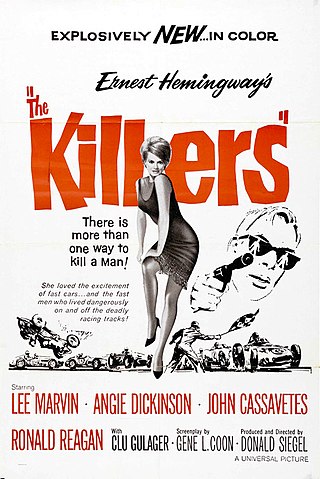
The Killers is a 1964 American neo noir crime film. Written by Gene L. Coon and directed by Don Siegel, it is the second Hollywood adaptation of Ernest Hemingway's 1927 short story of the same title, following the 1946 version. There is also a 1956 Russian version directed by Andrei Tarkovsky.
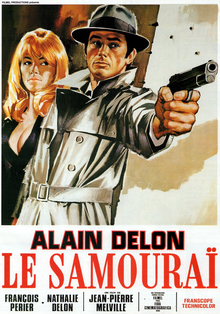
Le Samouraï is a 1967 neo-noir crime thriller film written and directed by Jean-Pierre Melville and starring Alain Delon, François Périer, Nathalie Delon, and Cathy Rosier. A Franco-Italian production, it depicts the intersecting paths of a professional hitman (Delon) trying to find out who hired him for a job and then tried to have him killed, and the Parisian commissaire (Périer) trying to catch him.
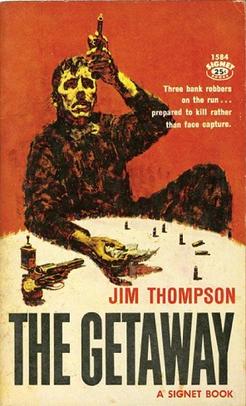
The Getaway is a 1958 crime novel by Jim Thompson.
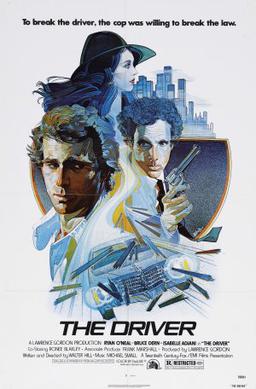
The Driver is a 1978 American crime thriller film written and directed by Walter Hill, and starring Ryan O'Neal, Bruce Dern and Isabelle Adjani. The film featured only unnamed characters, and follows a getaway driver for robberies whose exceptional talent has prevented him being caught. A detective promises pardons to a gang if they help catch him in a set-up robbery.
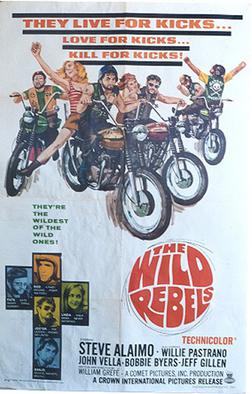
Wild Rebels is a 1967 film directed by William Grefe and starring Steve Alaimo as Rod Tillman, a stock car driver who goes undercover as the wheelman for a motorcycle gang. The tagline for the film was "They live for kicks... love for kicks... kill for kicks".

Dead End Drive-In is a 1986 Australian dystopian action film about a teenage couple trapped in a drive-in theatre which is really a concentration camp for societal rejects. The inmates, many of whom sport punk fashion, are placated with a steady diet of junk food, new wave music, drugs, and exploitation films. The film was directed by Brian Trenchard-Smith and stars Ned Manning and Natalie McCurry as the captive couple, and Peter Whitford as the manager of the drive-in. Mad Max 2 stuntman Guy Norris did some of the stunts. The soundtrack includes contemporary popular music performed by such bands as Kids in the Kitchen and Hunters and Collectors. The song during the rolling credits is "Playing With Fire" by Lisa Edwards.

Turkey Shoot is a 1982 Australian dystopian action film directed by Brian Trenchard-Smith. Its ensemble cast — an eclectic mix of international stars, Australian soap opera veterans and character actors — is led by Steve Railsback, Olivia Hussey, Michael Craig, Noel Ferrier, Carmen Duncan, Roger Ward and Lynda Stoner. The film marks the first of three directorial collaborations between Trenchard-Smith and producer Antony I. Ginnane — the others being The Siege of Firebase Gloria (1989) and Arctic Blast (2010) — although the director had previously made promotional reels and trailers for Ginnane's earlier films.
Day of the Assassin is a 1979 American-Spanish-Mexican action film directed by Brian Trenchard-Smith, who called it "a trainwreck of a movie."

Heaven's Burning is a 1997 Australian crime film starring Russell Crowe and directed by Craig Lahiff. The film was released in Australia on 6 November 1997. It follows the adventures of an Australian getaway driver (Crowe) and a Japanese runaway bride on a road trip as they are pursued by both criminals and the police. This was Russell Crowe's last Australian film until 2014's The Water Diviner.

The Man from Hong Kong, originally released in the US as The Dragon Flies, is a 1975 action film written and directed by Brian Trenchard-Smith in his directorial debut and starring Jimmy Wang Yu and George Lazenby, with Hugh Keays-Byrne, Roger Ward, Rosalind Speirs, Rebecca Gilling, Sammo Hung, Grant Page and Frank Thring in supporting roles. The first film to be made as an international coproduction between Australia and Hong Kong, it serves as a satire of the James Bond and Dirty Harry franchises, combined with tropes of the concurrent chopsocky craze. Its plot follows Inspector Fang Sing Leng (Wang) of the RHKPF's Special Branch, who travels to Sydney to perform an extradition, only to find himself locked in battle with Jack Wilton (Lazenby), the city's most powerful crime lord.

Faster is a 2010 American action thriller film directed by George Tillman Jr. The film stars Dwayne Johnson, Billy Bob Thornton, Oliver Jackson-Cohen, Carla Gugino, Maggie Grace, Moon Bloodgood, Adewale Akinnuoye-Agbaje, and Tom Berenger. Faster was released on November 24, 2010. The film received mixed reviews from critics and grossed $35 million against a production budget of $24 million.

Getaway is a 2013 American action thriller film starring Ethan Hawke, Selena Gomez, James Maslow and Jon Voight. Directed by Courtney Solomon and written by Gregg Maxwell Parker and Sean Finegan, the film is distributed by Warner Bros., Though originally reported to be a remake of the 1972 film The Getaway, the film is actually an original story. This is the first film directed by Solomon in eight years, with his last being 2005's An American Haunting. The film was a critical and commercial failure, grossing $11 million against its $18 million budget.

Special Cop in Action is a 1976 Italian poliziottesco film directed by Marino Girolami, here credited as Franco Martinelli. The film is the final chapter in the Girolami's Commissioner Betti Trilogy, after Violent Rome and Violent Naples, though a spin-off in the series entitled Weapons of Death would be released the following year.
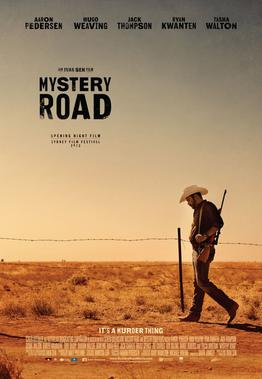
Mystery Road is a 2013 Australian crime film with neo-Western elements and setting, written and directed by Ivan Sen. It was screened in the Special Presentation section at the 2013 Toronto International Film Festival. A film sequel entitled Goldstone was released in 2016, and TV series in 2018, all featuring Aaron Pedersen as the brooding Indigenous Australian detective Jay Swan.

Reclaim is a 2014 action thriller film directed by Alan White and starring John Cusack. The film was released on video on demand, with a simultaneous limited theatrical release in the United States, on September 19, 2014. Phillippe and Lefevre play an American couple who travel to Puerto Rico to adopt an orphan, and become entangled in a deadly scam.
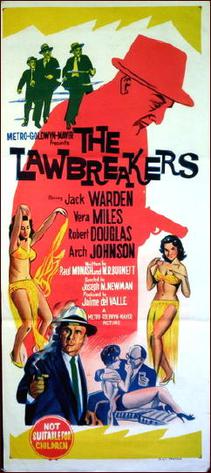
The Lawbreakers is a 1961 American film directed by Joseph M. Newman. Made in a film noir style, the crime drama is based on the pilot episode of the 1961 television series The Asphalt Jungle and stars an ensemble cast including Jack Warden, Vera Miles, Robert Douglas, and Arch Johnson.
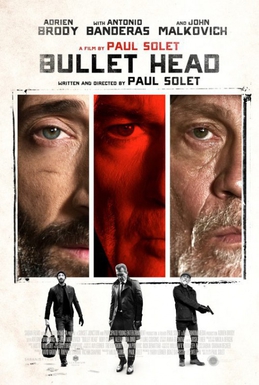
Bullet Head is a 2017 American-Bulgarian crime thriller film written and directed by Paul Solet and starring Adrien Brody, Antonio Banderas, and John Malkovich.
On 28 March 1991 a member of the Ulster Volunteer Force (UVF), a loyalist paramilitary group, shot dead three Catholic civilians at a mobile shop in Craigavon, County Armagh, Northern Ireland. The gunman boarded the van and shot two teenage girls working there, then forced a male customer to lie on the pavement and shot him also. The killings were claimed by the "Protestant Action Force", who alleged the mobile shop was owned by an Irish republican. Staff said they had been harassed by Ulster Defence Regiment (UDR) soldiers for not serving them.
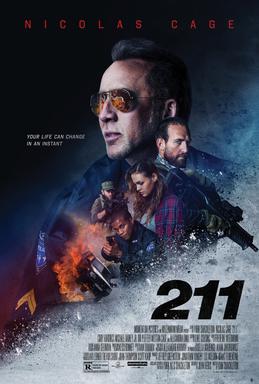
211 is a 2018 American crime action film directed by York Shackleton and written by John Rebus, based on a screenplay by Shackleton. The film stars Nicolas Cage, Dwayne Cameron, Alexandra Dinu, Michael Rainey Jr., Sophie Skelton and Ori Pfeffer. Very loosely based on the 1997 North Hollywood shootout, the plot follows a policeman and a teenager who are locked in a violent shootout with heavily-armed bank robbers.

Body Cam is a 2020 American police procedural horror film directed by Malik Vitthal, from a screenplay by Nicholas McCarthy and Richmond Riedel and a story by Riedel. The film stars Mary J. Blige, Nat Wolff, David Zayas, David Warshofsky, Demetrius Grosse and Anika Noni Rose.


















